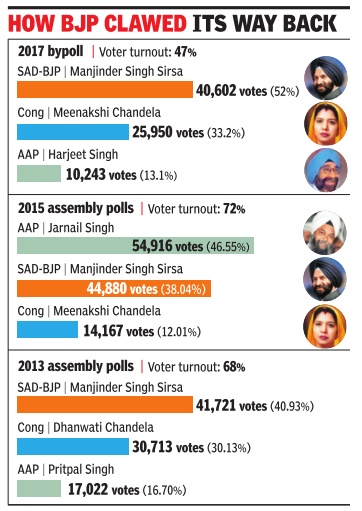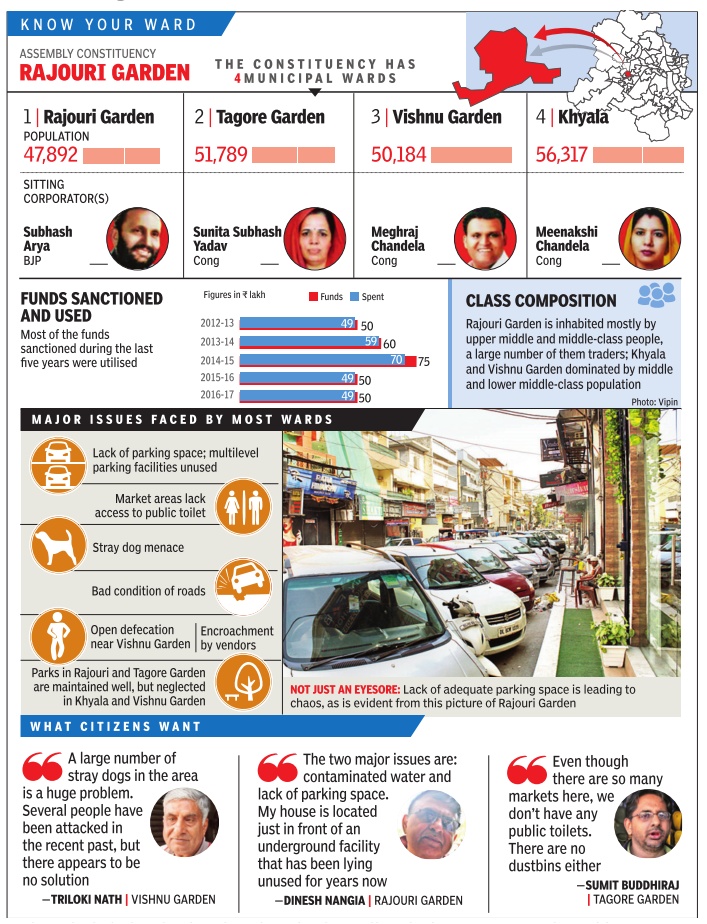Delhi: Rajouri Garden
This is a collection of articles archived for the excellence of their content. |
Contents |
A constitutional profile
2013-2017: how top 3 parties fared

See graphic:
How top three parties fared, Rajouri Garden, New Delhi
A constituency profile, As in 2020
Pankhuri Yadav, January 13, 2020: The Times of India

From: Pankhuri Yadav, January 13, 2020: The Times of India
New Delhi: “It is nothing less than a festival when political leaders come asking for votes. They make tall claims but sadly, every time we convince ourselves to believe them we find ourselves being let down,” said Asha Khanna, a resident of D Block in Tagore Garden. Indeed, when you look around, we see why the people grumble. Debris from construction sites is carelessly dumped around, there is garbage in public view and the resident swear the sewerage is no good either.
Khyala can be seen as emblematic of this neglect. It has for long been a blot on the Rajouri Garden assembly constituency. Yet despite promises for improvement made by political parties at every poll, no tangible changes have come in the area.
Tagore Garden’s Khanna added, “We are suffering, to say the least. The only good thing that has happened is that our water and electricity bills have gone down to zero.” So even with the skewed development, the voters believe that the Aam Aadmi Party is best placed to bring about changes if re-elected. But BJP is not a write-off and will probably put up a tough fight in many prominent areas in the constituency.
The Rajouri Garden constituency has rural and urban voters ranging from different economic classes. Dominated by a Sikh populace, the concerns of the people, however, are common: poor road infrastructure and abysmal sanitation, both of which the political contenders had claimed to better during the last election campaign but in vain.
In the 2015 assembly polls, AAP’s Jarnail Singh got 54,916 votes to forge ahead of Shiromani Akali Dal’s Majinder Singh Sirsa (44,880) contesting as a BJP candidate. Congress candidate, Meenakshi Chandela, was third with 14,167 votes. However, since 2017, after Singh resigned to contest in the Punjab assembly elections, necessitating a bypoll, Sirsa has been the sitting MLA.
Fear looms over the streets in the constituency. “We do not feel safe here. Whether it 8 in the morning or 8 at night, I cannot step out of my house without being apprehensive about cat-calls or harassment,” said Vandana Singhal, who lives in J Block at Vishnu Garden. “There is a need for more CCTV cameras. Police patrolling also has to increase so that women can at least step out of their houses without this constant worry.”
This foreboding also bothered Ranjana Sharma of T Block, Rajouri Garden. She said that the reduced electricity and water bills do not make much of a difference to her and her family, but the fear of walking outdoor without the company of a male is a burden. “If this major problem is solved, any party that makes such a difference will get voted again and again,” asserted Sharma.
Civic issues
2017
Paras Singh, Parking a big thorn in these Gardens, April 5, 2017: The Times of India

Rajouri will vote twice in a fortnight, first to elect a new MLA on April 9 and then a fortnight later to choose new representatives for the South Delhi Municipal Corporation. In one, the residents are certain to demand long-term solutions to the development shortcomings in the assembly constituency , and in the other, reiterate these lacks in the four municipal wards of Rajouri Garden, Tagore Garden, Vishnu Garden and Khyala.
Rajouri Garden and Tagore Garden, unlike most wards in the capital, have good roads, functioning street lights and well-maintained parks. But affluence comes with its own baggage, and the resident businessmen and traders struggle with parking. Casting an eye on Arya Park in J Block of Rajouri Garden, which is now used as a parking lot, AS Walia asked, “If we don't park cars in these open spaces, where else can we keep them?“ Subhash Arya, leader of the House and himself a resident of Rajouri Garden, admitted that the National Green Tribunal has disallowed the use of parks for cars, but said that with the problem here to stay , there is no option.“We are planning to introduce steel structures fitted with lifts so that multiple vehicles can share the same space currently occupied by one car,“ he revealed.
SDMC did undertake the creation of three underground parking lots there, but work is yet to be completed despite the planning having taken place before the 2010 Commonwealth Games. “The work order has been held up because of the election code of conduct,“ Arya pleaded.
SDMC officials lamely said that restaurants and hotels in the markets should allow their washrooms to be used by the public. They also claimed that the underground parking projects only had minor work remaining before becoming operational. The needs of Khyala and Vishnu Garden are completely different. The husband-wife team of Meenakshi and Meghraj Chandela represent the two in SDMC.
Despite the Chandelas' long-term association with the two wards, the mostly unauthorised colonies, un planned stretches and JJ clusters are a grim picture of apathy with their filth, pock-marked roads and clogged drains.
Stray dogs are a particularly disconcerting problem. Nazim Khan in Raghubir Nagar showed dog-bite scars on his legs and alleged that every other day someone got attack ed by packs of strays. To add to this are the hazards that have accompanied the growth of a second-hand clothes market and a smallscale iron industry in Khyala.Slums have sprung up to house the people engaged by these ventures, leading to a severe strain on civic amenities. “The use of drums to store water has led to mosquitos breeding and we have a huge number of dengue and chikungunya cases every year,“ said Nakul Waghri. And unfortunately , despite the presence of DUSIB toilets in the area, most misuse parks and vacant plots as open toilets.